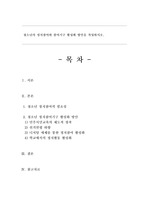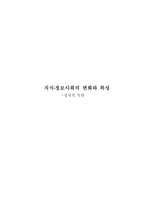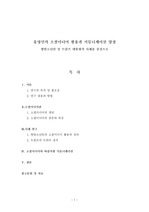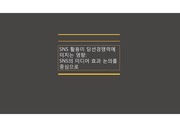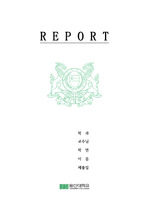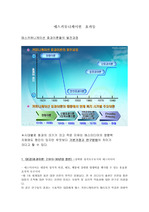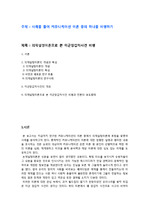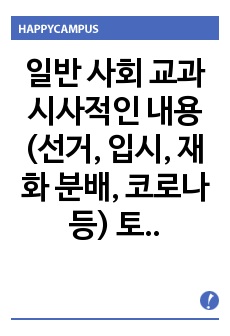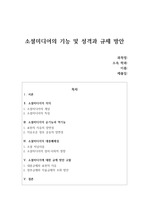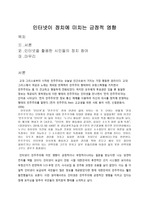

-
미리보기
소개
미디어선거의 방향과 한계목차
1. 들어가는 말
2. 미국의 미디어 선거
3. 우리 미디어선거의 나아갈 방향본문내용
1. 들어가는 말
김종필 자민련 전 총재는 92년 대선에서 2조원이 넘는 돈이 뿌려졌다고 말한 바 있다. 김 전총재의 말이 어느 정도 정확한 말인지는 알 수 없으나 그 말에 이의를 제기하는 이는 별로 없다. 당시 시중에는 신고액수가 실제 사용액의 10분의 1에도 미치지 못한다는 얘기가 흘러 다녔고, 실제로도 전국의 유명 관광지마다 유권자들을 실어 나른 버스들이 넘쳐 났다. 그리고 주요 정당들은 서울 여의도 등 주요 도시에서 100만여 명이 운집한 대규모 유세를 치렀는데, 일당을 최소로 잡아도 한 차례 집회당 수백억 원의 ‘동원비’가 사용됐을 것이라는 게 정치권의 일반적인 계산법이다 (뉴스피플 1997/12/25). 이런 ‘원죄’ 때문에 92년 대선자금 문제는 그 후로도 김영삼 정권은 물론 김대중 정권까지 계속해서 남아서 정권의 발목을 잡게 된다.
이러한 돈 선거의 후유증을 막기 위해 제시된 방법중의 하나가 미디어 선거였다. 1997년의 15대 대통령선거에서는 대통령 선거사상 최초로 TV 후보자 토론을 개최하게 된 것을 비롯하여 TV와 라디오 연설, 방송․신문 광고가 대폭 확대되었다. 이러한 미디어선거의 강화가 선거자금을 실제로 어느 정도 축소시켰는지 는 알 수 없지만, 적어도 옥외집회의 군중동원 선거에서 그래프와 여론조사 선거로 선거의 무게중심을 옮겨가고 있는 것만은 확실하다.
1997년 대통령선거 당시 유권자들의 투표결정에 대한 여론조사를 보면, TV토론이 후보를 선택하는데 가장 많은 영향을 주었다고 대답한 응답자가 절반을 넘어 51.6%로 나타났다. 그 다음 순위도 역시 TV 연설(16.8%)과 신문 방송의 보도(10.5%), 신문 방송의 광고(6.9%)로 나타나고 있음에 반하여, 주위사람-가족-친척(4.5%), 선거유세(3.3%) 벽보팜플렛(1.6%)은 극히 미미하게 나타나고 있어서 미디어 선거의 위력을 가늠하고도 남는다.
이러한 선거문화의 중심이동에 힘입어 많은 정치 개혁론자들은 미디어선거의 강화가 고질적인 돈 선거를 해결하는 지름길이라고 주장하고 있으며, 선거관리위원회 역시 미디어선거의 대폭적인 강화를 내용으로 하는 선거법개정의견을 내놓고 있다.
이러한 움직임이 16대 대선 이전에 선거법의 개정으로 연결될 수 있을지는 알 수 없지만, 법이 개정되지 않는다고 해도 미디어선거의 강화는 어쩔 수 없는 대세라고 할 수 있을 것이다. 이미 각 TV 방송사와 신문사가 대참고자료
· Atkin, C. and Heald, G.. 1976. Effect of Political Advertising. Public Opinion Quarterly.
· Bailey, Michael A., Faucheux, Ronald A., Herrnson, Paul S. and Wilcox Clyde. 2000. Campaign & Elections: Contemporary Case Studies. Congressional Quarterly.
· Bartels, Larry M. and Vaveck, Lynn. 2000. Campaign Reform: Insights and Evidence. University of Michigan Press.
· Bennett, W. Lance. 1996. The Governing Crisis: Media, Money, and Marketing in American Elections. NY: St. Martin`s Press.
· Bowen, L.. 1994. Time of voting decision and use of political advertising: The Slade Gorton-Brock Adams senatorial campaign. Journalosm and Mass Communication Quarterly
· Buchanan , Bruce. 1996. Renewing Presidential Politics: Campaigns, Media, and The Public Interest. Rowman& Littlefield Publishers.
· Coleman, Stephen. 2000. Televised Election Debates: International Perspectives. Macmillan Press.
· Evans, Geoffrey and Norris, Pippa . 1999. Critical Election: British Parties and Voters in Long-term Perspective. London: Sage Publications.
· Hofstetter, C.R. and Zukin, C.. 1979. TV network news and advertising in the Nixon and McGovern campaigns. Journalism Quarterly.
· Holbrook, Thomas M.. 1996. Do Campaigns Matter?. Sage Publication.
· Jackson, John S. Ⅲ and Crotty, William. 1996. The Politics of Presidential Selection. Harper Collins College Publishers.
· Kaid, L.L.. 1998. Videostyle and the effects of the 1996 presidential campaign advertising. In R. E. Denton.
· Kaid, L.L. and Johnston, A.. 1991. Negative versus positive television advertising in presidential campaigns. 1960-1988. Journal of Communication.
· Kern, M.. 1989. 30-second politics: Political advertising in the eighties. New York: Praeger.
· King, Anthony Stephen. 1997. Running Scared: Why America`s Politicians Campaign Too Much and Govern Too Little. NY: The Free Press
· Kolodny, Robin. 1998. Pursuing Majorities: Congressional Campaign Committees in American Politics. Norman: University of Oklahoma.
· Kowalski, Kathiann. 2000. Campaign Politics: What`s Fair? What`s Foul? Lerner Publications Company.
· Martinelli, K.A. and Chaffee, S.H.. 1995. Measuring new-voter learning via three channels of political information. Journalism and Mass Communication Quarterly.
· Patterson, T.E. and McClure, R.D. 1976. The unseeing eye: Myth of television power in Politics. New York: Putnam.
· Rothschild, M.L. and Ray, M.L. 1974. Involvement and political advertising effect: An exploratory experiment. Communication Research.
· Scher, Richard. K. 1997. The Modern Political Campaign: Mudslinging, Bombast, and the Vitality of American Politics. M. E. Sharpe.
· Shaw, Catherine M.. 2000. The Campaign Manager: Running and Winning Local Elections. Westview Press.
· Tenpas, Kathryn Dunn. 1997. Presidents As Candidates: Inside the White House for the presidential campaign. Garland Publishing.
· Wayne, Stephen J. 2000. The Road to The White House, 2000 :The Politics of Presidential Elections. Bedford/St. Martin`s.
· Zhao, X. and Bleske, G.L. 1995. Measurement effects in comparing voter learning from television news and campaign advertisements. Journalism and Mass Communication Quarterly.태그
-
자료후기
-
자주묻는질문의 답변을 확인해 주세요

꼭 알아주세요
-
자료의 정보 및 내용의 진실성에 대하여 해피캠퍼스는 보증하지 않으며, 해당 정보 및 게시물 저작권과 기타 법적 책임은 자료 등록자에게 있습니다.
자료 및 게시물 내용의 불법적 이용, 무단 전재∙배포는 금지되어 있습니다.
저작권침해, 명예훼손 등 분쟁 요소 발견 시 고객센터의 저작권침해 신고센터를 이용해 주시기 바랍니다. -
해피캠퍼스는 구매자와 판매자 모두가 만족하는 서비스가 되도록 노력하고 있으며, 아래의 4가지 자료환불 조건을 꼭 확인해주시기 바랍니다.
파일오류 중복자료 저작권 없음 설명과 실제 내용 불일치 파일의 다운로드가 제대로 되지 않거나 파일형식에 맞는 프로그램으로 정상 작동하지 않는 경우 다른 자료와 70% 이상 내용이 일치하는 경우 (중복임을 확인할 수 있는 근거 필요함) 인터넷의 다른 사이트, 연구기관, 학교, 서적 등의 자료를 도용한 경우 자료의 설명과 실제 자료의 내용이 일치하지 않는 경우
함께 구매한 자료도 확인해 보세요!
-
미디어 선거(17대 총선을 중심으로) 20페이지
제 1 절 들어가며 우리나라의 선거행태는 해방이후의 전쟁과 독재라는 혼란 속에서 민주적으로 자리 잡을 수 있는 기회를 얻지 못하였다. 1987년의 민주화 이후에도 선거행태는 삼김(三金)으로 대표되는 특정정치인에 대한 추종의 한계를 벗어나지 못했으며 이는 오랫동안 우리나라의 정치과정속에서 지역간의 배타적 속성으로 작용하여 영, 호남으로 양분된 선.. -
신문매체의 인터넷포털사이트 검색어순위에 대한 의제설정연구 10페이지
1장. 연구목적 인터넷 등 대안매체의 등장으로 ‘4대 매체’ 로 그 영향력을 자랑하던 신문은 쇠퇴의 길을 걷게 될 것이라는 예견들이 쏟아지고 있다. 하지만 신문은 ‘의제설정’ 매체로써 여전히 그 위력을 떨치고 있다. 본 연구에서는 신문의 의제설정 기능이 수용자 개개인뿐만이 아니라 다른 매체(특히 4대 매체 이외의 대안매체)의 의제설정에도 영향을 줄.. -
우리나라 미디어 산업의 현황과 문제점 8페이지
이미 많은 선진국에서는 규제를 완화해 나아감에 따라서 많은 사업 분야에서 민영화를 이루고 있다. 그로인하여 경쟁을 촉진시켜 시청자들에게 이익을 돌려주는 효과를 기대하기 때문이다. 이에 따라 아직도 방송3사가 독점하고 있으며 공급자가 주도하고 있는 폐쇄적이며 구시대적인 우리나라의 정책, 규제 등은 근본적으로 변화해야 할 필요가 있는 것이다. 특히 우리나라의 .. -
[광고, 마케팅, 정치] 대선 전략기획서 71페이지
2002년 12월 대선을 앞두고 기획한 대선 전략 기획서입니다. - 시사점 - 인구는 증가하고 있으나 20, 30대는 감소하는 추세로 민주세대의 영역이 좁혀지고 있다. 반면 40대인 개발세대는 더욱 증가하였다. 지역별로 유권자수는 서울, 경기, 경상도, 부산등 영남쪽이 인구수가 더 많으며 호남쪽은 상대적으로 적음을 알 수 있다. .. -
[광고홍보학] 제16대 대선 정치광고 분석 23페이지
노무현의 당선은 우리사회의 변화를 보여주는 사건이라고 볼 수 있다. 세대혁명 혹은 유권자혁명으로 대표되는 올 16대 대선은 유권자와 국민이 주인이 되는 정치소비자시대의 개막을 알리는 서곡이다. 이는 정치주변부에서 맴돌던 20~30대의 자발적이고 적극적인 정치참여와 세대혁명은 새로운 정치에 대한 국민적 열망의 결과였다. 이제 우리 정치도 새로운 패러다임으로의..
찾으시던 자료가 아닌가요?
지금 보는 자료와 연관되어 있어요!
문서 초안을 생성해주는 EasyAI
![[정치]미디어선거의 방향과 한계](https://image4.happycampus.com/Production/thumb212/2006/08/11/data4181790-0001.jpg)


